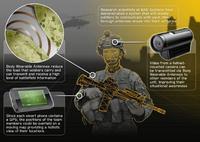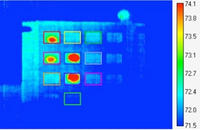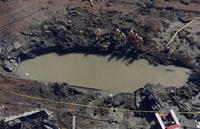-
General Dynamics to integrate CBRN device in Army radios
General Dynamics C4 Systems announced last week that it will work with U.S. Army researchers to install wireless-networking chips on radios that can also detect the presence of dangerous chemicals on the battlefield
-
-
Body wearable antennas for soldiers, first responders

Body Wearable Antennas (BWAs) allow soldiers to communicate with their colleagues on the front line without the need for conventional radio whip-antennas which can be cumbersome and conspicuous; NWS can also be incorporate into the suits of fire-fighters for use during search and rescue, for police patrol team members to have the GPS locations of their colleagues, and in other hazardous industries such as mining, oil, and gas
-
-
Doppelganger Domains threaten 30 percent of Fortune 500 companies
30 percent of Fortune 500 companies are vulnerable to Doppelganger Domains attacks; a Doppelganger Domain is a domain spelled identically to a legitimate fully qualified domain name (FQDN) but missing the dot between host/subdomain and domain, to be used for malicious purposes
-
-
9/11 generates growth of homeland security college programs

The 9/11 attacks led to a flurry of spending not only on defense and homeland security needs, but also education; in recent years dozens of homeland security programs have emerged at community colleges, universities, and graduate schools across the country and thousands of students have flocked to these new programs lured by the promise of jobs
-
-
Decade after 9/11, infrastructure interdependence a major problem for U.S.
After years of study of the impact on infrastructure of the 9/11 attacks, a groups of experts paints a disconcerting picture of major infrastructure systems that were highly dependent upon one another; even today, these experts see this deep interdependency as a liability and threat to national security and the quality of life for its citizens
-
-
General Dynamics teams up with Virginia Tech to bolster cybersecurity
Defense giant General Dynamics’ cybersecurity division has teamed up with Virginia Tech to help strengthen the nation’s cybersecurity research capabilities; on Wednesday, the company announced that its Advanced Information Systems branch will assist Virginia Tech with its new Security and Software Engineering Research Center (S2ERC)
-
-
BAE Systems shows invisibility cloak-wrapped vehicle
BAE Systems has tested an invisibility cloak that allows a vehicle to blend into its surroundings; sheets of hexagonal “pixels,” which can change temperature very rapidly, allow vehicles — even moving tanks — to match their surroundings, thus making them invisible
-
-
Exports of U.S. advanced technology products suffer less in recession
Advanced technology products (ATP) exports fell from $270 billion in 2008 to $245 billion in 2009 — but this 9 percent drop was less than half the decline of non-ATP exports
-
-
Terrahawk showcases its mobile surveillance vehicle
This Thursday Terrahawk, LLC will show off its Mobile Utility Surveillance Tower (MUST) to members of the U.S. House of Representatives and the Senate along with their staffs; with MUST, law enforcement agencies can quickly set up a mobile surveillance tower for emergency response, crowd control, or general surveillance
-
-
Cutting soot emissions fastest, cheapest way to slow warming
Reducing soot emissions from diesel engines and other sources could slow melting of sea ice in the Arctic faster and more economically than any other quick fix; the good news is that decreasing soot could have a rapid effect — unlike carbon dioxide, which remains in the atmosphere for years, soot disappears within a few weeks, so that there is no long-term reservoir with a continuing warming effect
-
-
Thermal imaging allows ATM theft from a distance

ATMs’ PINs can be stolen using thermal imaging cameras; when ATM customers press down keys to enter their personal code number, they leave behind residual heat from their fingertips; thermal imaging cameras can catch these numbers
-
-
Tomato giant fined for hiring illegal workers
Last week, the largest year-round grower of greenhouse tomatoes in the United States was fined $600,000 for knowingly hiring undocumented workers; Eurofresh Inc., pled guilty to the charges of employing illegal workers and now faces a five year probation
-
-
Report finds poor management cause of San Bruno natural gas explosion

An investigation into the cause of a natural gas pipeline explosion that killed eight people and destroyed dozens of homes in San Bruno, California, placed the blame squarely on fifty-four years of bad management by Pacific Gas & Electric Company (PG&E) and the failure of state and federal regulators to notice the problem
-
-
IBM acquires security threat, fraud detection software developer
Acquisition extends IBM’s menu of offerings for governments, law enforcement, retail, insurance, and healthcare clients in what the company describes as “the Era of Smarter Cities”
-
-
Lawmakers struggling to end critical medicine shortage
Critical shortages for medicines needed in treating life-threatening illnesses have lawmakers and public health officials scrambling to find solutions; this year alone, a record high of more than 180 drugs crucial for treating childhood leukemia, breast and colon cancer, infections, and other diseases have been declared in short supply
-
More headlines
The long view
Ransomware Attacks: Death Threats, Endangered Patients and Millions of Dollars in Damages
A ransomware attack on Change Healthcare, a company that processes 15 billion health care transactions annually and deals with 1 in 3 patient records in the United States, is continuing to cause massive disruptions nearly three weeks later. The incident, which started on February 21, has been called the “most significant cyberattack on the U.S. health care system” by the American Hospital Association. It is just the latest example of an increasing trend.
Chinese Government Hackers Targeted Critics of China, U.S. Businesses and Politicians
An indictment was unsealed Monday charging seven nationals of the People’s Republic of China (PRC) with conspiracy to commit computer intrusions and conspiracy to commit wire fraud for their involvement in a PRC-based hacking group that spent approximately 14 years targeting U.S. and foreign critics, businesses, and political officials in furtherance of the PRC’s economic espionage and foreign intelligence objectives.
European Arms Imports Nearly Double, U.S. and French Exports Rise, and Russian Exports Fall Sharply
States in Europe almost doubled their imports of major arms (+94 per cent) between 2014–18 and 2019–23. The United States increased its arms exports by 17 per cent between 2014–18 and 2019–23, while Russia’s arms exports halved. Russia was for the first time the third largest arms exporter, falling just behind France.
LNG Exports Have Had No Impact on Domestic Energy Costs: Analysis
U.S. liquified natural gas (LNG) exports have not had any sustained and significant direct impact on U.S. natural gas prices and have, in fact, spurred production and productivity gains, which contribute to downward pressure on domestic prices.
